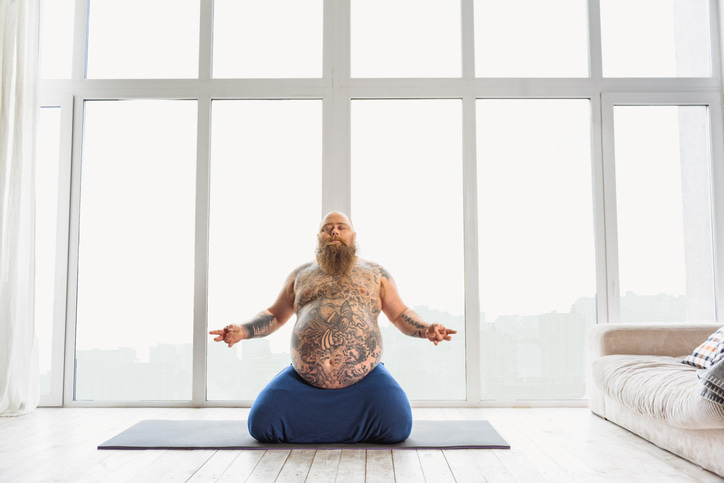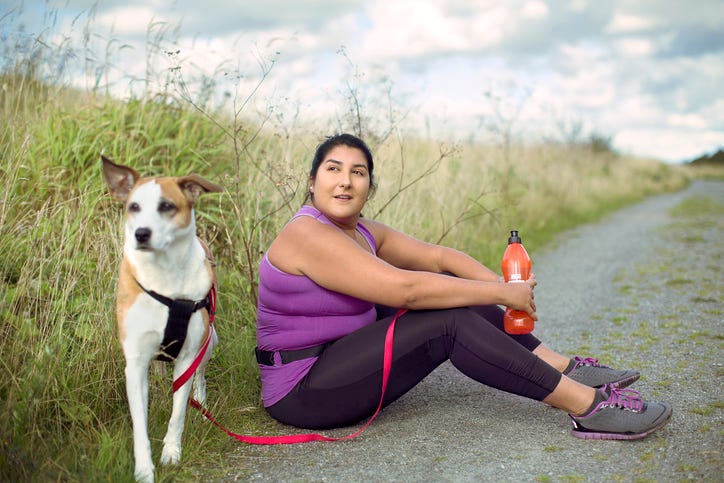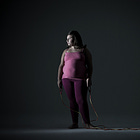So I know I said earlier this month that I didn’t have big plans for Year 3 of Burnt Toast, other than to keep doing what seems to be working here. (Reporting on anti-fat bias and diet culture, writing personal essays about various facets of these issues, answering your questions, interviewing great podcast guests, and chatting with you all about all of the above but also clothes, books, plants, etc.)
But in continuing to reflect on the past two years, and read your responses to the reader survey (you can still take it through the end of this week!) I’ve come up with one new recurring feature idea: Guides. One thing that makes the Burnt Toast community distinct is that we are a real mix of folks who have been steeped in fat liberation for decades now, and folks who are (I say lovingly!) fresh off their last Noom download and just starting to wrap their heads around these concepts. This means that two themes were threaded through your responses to the reader survey: “I tend to tune out when you do the more fat politics 101 content” and “sometimes I feel lost because there’s so much I’m still learning here.” Both extremely fair takes depending on where you are in your diet culture divestment journey!
Here’s my solution: I’m going to continue to write essays and features that take us deep into the nuances of these questions, knowing some of those come with a bit of a learning curve for newbies. But I’m also going to start a regular series called Guides, where I’ll dig into your most frequently asked questions. As you’ll see from the first Guide below, these will be a mix of new writing and a way to collate everything I’ve already written or recorded on that particular question—but it will now be much easier to find because the Guides will all be listed together under one tab on the Substack homepage. I’ll also link to other sources who have done better/deeper dives on particular questions, so if you’re wrestling with questions about the science on weight and health (that’s today!) or how to navigate family dinner (coming up next!), you’ll find a whole bunch of rabbit holes you can go down to get all the nuances of your questions answered.
OG Fat Lib/Anti-Diet Readers: You can absolutely opt out of the Guide emails (which will come about once a month) by unchecking that box in your account settings. But I actually hope a lot of you won’t, because I’m hoping the comment sections on these Guides can become a place for further learning and discourse. Only contribute to the extent that feels interesting or doable to you, of course—but know that your fact-checking and additional resources and insights are very, very welcome here. (Comments will remain paid only because that keeps the trolls out, but just email me for a comp if you’d like to engage and that’s a barrier.)
Everyone: We’ve got a big list of Guide topics I’ll be working through over the next few months, but definitely drop your ideas in the comments (or hit reply to this email).
PS. For now, these Guides will be free to read. But you should still consider a paid subscription if you find them valuable, especially because those are 20% off, this week only!
The Burnt Toast Guide to Weight and Health

1. Health Is Not the Point.
The most important thing to understand when we talk about weight and health is that this conversation has basically nothing to do with dismantling anti-fat bias. “Being fat is bad for your health” is a sentence that is both inherently biased and frequently untrue (as we’ll see). But: Even if it were always true that the more you weigh, the sicker you become, it still wouldn’t be okay to discriminate against fat people. Because discrimination isn’t any more justified when it’s against people who are chronically ill, disabled, or just “unhealthy,” however you choose to define it. Yes, even if you are sure they arrived that this health status through their own laziness, deviant behavior, or ignorance. We all get the same human rights just for being here.
I’m starting with that point because “But what about health?” is the number one question asked by trolls and men who email me and other people with high levels of anti-fat bias. Usually this question is asked with a caveat: “Of course I’m not saying fatphobia is okay, but…” “I’m not anti-fat, I just think…” It is reasonable to still have questions about weight and health because you’ve been alive for some or all of the last 100 years of cultural messaging and have a lot of unlearning to do. It’s not reasonable to hope that if I acknowledge, yes, sometimes fat people are unhealthy, that this justifies your secret dislike of, and discomfort with, fat people.
Related Reading:
Is the AMA Finally Renouncing the BMI?
Marquisele Mercedes and the Big Fat Loophole in the Hippocratic Oath
We Must Stop Using Weight As A Proxy for Health
2. Correlation Versus Causation
Here’s the main reason you’ve always assumed that being fat is unhealthy: In 99.9% of media coverage about the ob*sity epidemic, “fat is bad” is presented as a foregone conclusion. This leads us all to assume that we have a big pile of scientific evidence somewhere documenting all the ways that the literal pounds of fat sitting on someone’s body are nefariously brewing diabetes, heart disease, and other health issues.
We don’t.
We have lots of large-scale studies documenting a correlation between high body size and worse health outcomes. We have some research suggesting biological pathways between weight and certain health condition. But we do not have definitive causal evidence of this relationship.
We also have large-scale evidence reviews demonstrating that an “overweight” or lower “ob*se” BMI correlates with a lower rate of death than a BMI in the “normal” or “underweight” ranges. And we know that high body weight can even be protective against certain health conditions (like osteoporosis) and is associate with a better survival rate after heart surgery. Researchers call this the “ob*sity paradox,” which is a nice little example of anti-fat bias built right into how the science gets done: It’s only labeled a “paradox” because it so thoroughly blows everybody’s minds whenever science demonstrates that fat people might sometimes be healthier than thin people.
Because we (and by “we” I mean the media and the general public but also many leading ob*sity researchers) have confused correlation and causation for so long, we don’t have enough research genuinely investigating why high body weight might correlate with poor health outcomes but not be the root cause. But there are some solid, and increasingly evidence-backed theories:
Increasing body weight could be a symptom of a health condition without causing that health condition. PCOS, for example, appears to drive up body size, but that does not mean that weight loss cures PCOS anymore than using eye drops during allergy season makes me any less allergic to ragweed.
Higher body size and certain health outcomes may both be driven by a different underlying cause. Here we’re looking into social determinants of health like access to healthcare, food insecurity, and chronic experiences of poverty and oppression. Frequent dieting and the related losing and regaining of weight may also play a major role in increasing blood pressure and insulin resistance. In all of these cases, prescribing weight loss won’t address the root cause of disease. (It may even be a root cause of disease.)
We are genetically predisposed to both our weight and health status. But that doesn’t mean that losing weight will solve for your family history of heart disease. It doesn’t even mean the same genetic pathways are predicting both variables. It just means that there is an awful lot about our bodies—and how they look and function—that is beyond our control.
Related Reading:
The Obesity Wars and the Education of a Researcher
Public health doesn’t have an obesity crisis
Maintenance Phase on The Obesity Epidemic
Maintenance Phase on the Body Mass Index
Study Shows Lack of Link Between High BMI and COVID Deaths
In Obesity Research, Fatphobia Is Always the X-Factor
What If Doctors Stopped Prescribing Weight Loss (paywalled)
3. Weight Loss Doesn’t Promote Health

Here’s the other bedrock misconception in all mainstream discussions of weight and health: Getting thinner always improves your health. Again, we meet up with correlation versus causation, because there are many studies demonstrating that a loss of X number of pounds correlated to a drop in blood pressure, insulin resistance and other biomarkers of health. But they don’t show a causal relationship. And we have plenty of other data showing that changing lifestyle habits can achieve these improvements regardless of whether you lose weight in the process.
Research extolling the health benefits of weight loss also doesn’t tend to follow participants long enough to find out what happens when they, inevitably, regain the weight. Which virtually everyone does in the two to five years following a diet. Weight loss, however it’s (temporarily) achieved, also carries significant risk for disordered eating, eating disorders and other side effects—none of which can be called health-promoting.
So even if fatness was always unhealthy, and even if weight loss could unequivocally improve health, the point is moot: We don’t have a safe, sustainable, and accessible way for the vast majority of people to do it.
Related Reading:
Why the New Obesity Guidelines Terrify Me (gift link)
Who Says Dieting Fails Most Of The Time?
Healthy lifestyle habits and mortality in overweight and ob*se individuals
Weight & Health Book List
Anti-Diet by Christy Harrison (here’s Christy Harrison, MPH, RD on the pod and check out her new book, The Wellness Trap!)
Belly of the Beast: The Politics of Anti-Fatness as Anti-Blackness by Da’Shaun Harrison
The Body Is Not an Apology by Sonya Renee Taylor
Body of Truth: How Science, History, and Culture Drive Our Obsession with Weight—and What We Can Do About It by Harriet Brown
Fat: The Owner’s Manual by Ragen Chastain (here's Ragen on the podcast!)
Fat Rights: Dilemmas of Difference and Personhood by Anna Kirkland
Fat Shame: Stigma and the Fat Body in American Culture by Amy Erdman Farrell
Fat! So? by Marilyn Wann
The Fat Studies Reader by Esther Rothblum and Sondra Solovay
Fearing the Black Body: The Origins of Fat Phobia by Sabrina Strings
What We Don’t Talk About When We Talk About Fat by Aubrey Gordon (here’s Aubrey’s first Burnt Toast Podcast episode!)
“You Just Need to Lose Weight”: And 19 Other Myths About Fat People by Aubrey Gordon (here’s her second!)
It's Always Been Ours: Rewriting the Story of Black Women’s Bodies by Jessica Wilson














Incredible resource here! Bookmarking it to share with others who are just ditching Noom or letting themselves bask in the glory of guilt free cracker snacking. 🫶
I’d also love to toss some love to anyone who’s neurodiverse (or perhaps doesn’t know it) and who assumes they’re just lazy or not disciplined enough. I grew up in a home where my parents’ special interests are religion and dieting. Like a lot of what Virginia points out above, the weight never stayed off. And it perpetuated massive levels of shame piled onto all the masking habits I carried socially and relationally. I have read in a lot of “literature” that Autistic people are lazy or exercise resistant and it’s wholly cast as yet another deficiency or human failure. (And I believed this for many years!)
Here’s the thing though: If you’re neurodiverse, many things about the world are intrinsically confusing and I’d argue, even unavoidably traumatizing. How exercise feels to others, could feel like walking into a war zone for your body. If you’re still masking 8-9 hours a day at a desk job that your body dreads every morning, good luck having any energy to find food that tastes good and satisfies you, let alone, at the end of the day to get any sort of movement in. (My days in a 9-to-5 were drenched in inner chaos I had to hide from others, sneaking food or Starbucks runs and then starving myself later.) Here’s what I didn’t have language to describe, though: I lived in burnout as a default, and then on top of it, I was cast as a problematic person or just plain lazy if I was not also thin from d*eting all the time.
It took a lot of trial and error to realize my body *was* on my side when I try to run (and it starts dropping into a panic attack from sweat and elevated heart rate)—running intrinsically sets off lots of alarm bells in my system. And it doesn’t mean you or I are lazy because we don’t “just push through” the panic attack. (Jfc just typing that sentence makes me angry!) Eating yummy food (when I was off my d*et) was literally the only time in my day where I wasn’t masking and could feel OKish for 8-10 minutes of my day.
TLDR: If you’re neurodiverse and learning how to unmask, or only mask in ways that serve you, there’s room for you to feel good inside your body just as you are. This isn’t another social rule you just can’t seem to get the hang of. You’re doing fine, things can feel better, and we want you here. 🫶
Thanks so much for this Virginia. Even though these ideas are familiar to me, it’s really great to know this information is here in one place if I ever need a resource to defend my position.